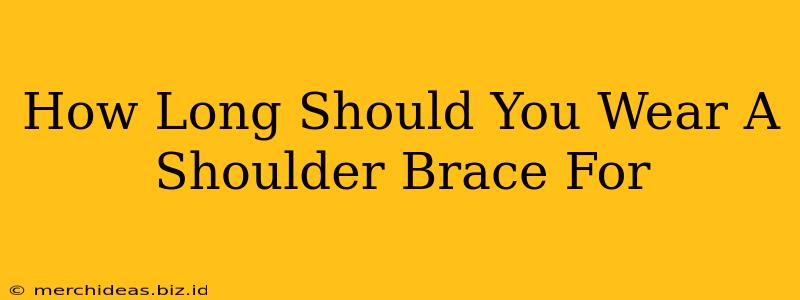Shoulder injuries are incredibly common, whether from sports, accidents, or simply the wear and tear of daily life. A shoulder brace can provide crucial support and help in the healing process, but the question remains: how long should you wear one? There's no single answer, as the duration depends on several factors. This guide will help you understand the variables influencing the length of time you'll need to wear your shoulder brace.
Factors Determining Brace Wear Time
The time you need to wear a shoulder brace varies greatly depending on several key factors:
1. Type of Injury:
- Rotator Cuff Tear: A minor rotator cuff tear might only require a brace for a few weeks, focusing on rest and controlled movement. More severe tears, however, may necessitate brace use for several months, potentially combined with physical therapy.
- Shoulder Dislocation: Dislocations often need longer bracing periods, sometimes several weeks, to ensure the joint heals properly and prevent recurrence. Post-dislocation, your doctor might recommend a brace even during activities to enhance stability.
- Fractures: Shoulder fractures require more prolonged brace usage, often several weeks or even months, depending on the severity and healing progress.
- Sprains and Strains: Less severe sprains and strains might only require short-term brace use, perhaps a few days to a couple of weeks, primarily for pain relief and support during healing.
- Post-Surgery: Following shoulder surgery, the duration of brace wear is strictly dictated by your surgeon's instructions and can range from several weeks to months.
2. Severity of the Injury:
A minor injury will naturally require less bracing time than a severe one. A simple strain might only need a brace for a short period to reduce pain and swelling, while a severe fracture will likely demand more prolonged use for proper bone healing and stability.
3. Individual Healing Rate:
Each individual heals at a different pace. Factors like age, overall health, and genetics influence healing time. Younger individuals often heal faster than older individuals. Your doctor will monitor your progress and adjust the brace usage accordingly.
4. Doctor's Recommendations:
This is the most critical factor. Your doctor or physical therapist will assess your specific injury, evaluate your progress, and provide personalized recommendations regarding the duration of brace usage. They will consider all the factors mentioned above and will adjust your treatment plan as needed. Never disregard your doctor's advice.
5. Physical Therapy Progress:
If physical therapy is part of your treatment plan, the duration of brace wear is often linked to your progress in therapy. As your strength and range of motion improve, your doctor or physical therapist might gradually reduce your brace usage.
Signs You Might Need to Adjust Brace Wear:
While following your doctor's advice is paramount, be aware of certain signs that might indicate a need for adjustment in your brace wearing schedule:
- Increased Pain: If your pain worsens while wearing the brace, consult your doctor immediately.
- Numbness or Tingling: This could signal nerve compression and requires prompt medical attention.
- Swelling: Persistent swelling despite wearing the brace may indicate an underlying issue.
- Lack of Progress: If you aren't seeing improvement in your shoulder function despite wearing the brace, discuss this with your doctor or physical therapist.
In Conclusion:
The duration of shoulder brace wear is highly individualized and depends on the type and severity of the injury, your healing rate, and your doctor's recommendations. Always consult with your healthcare professional for personalized advice and follow their instructions carefully to ensure optimal healing and recovery. Don't rush the process; prioritizing proper healing prevents potential long-term complications.
